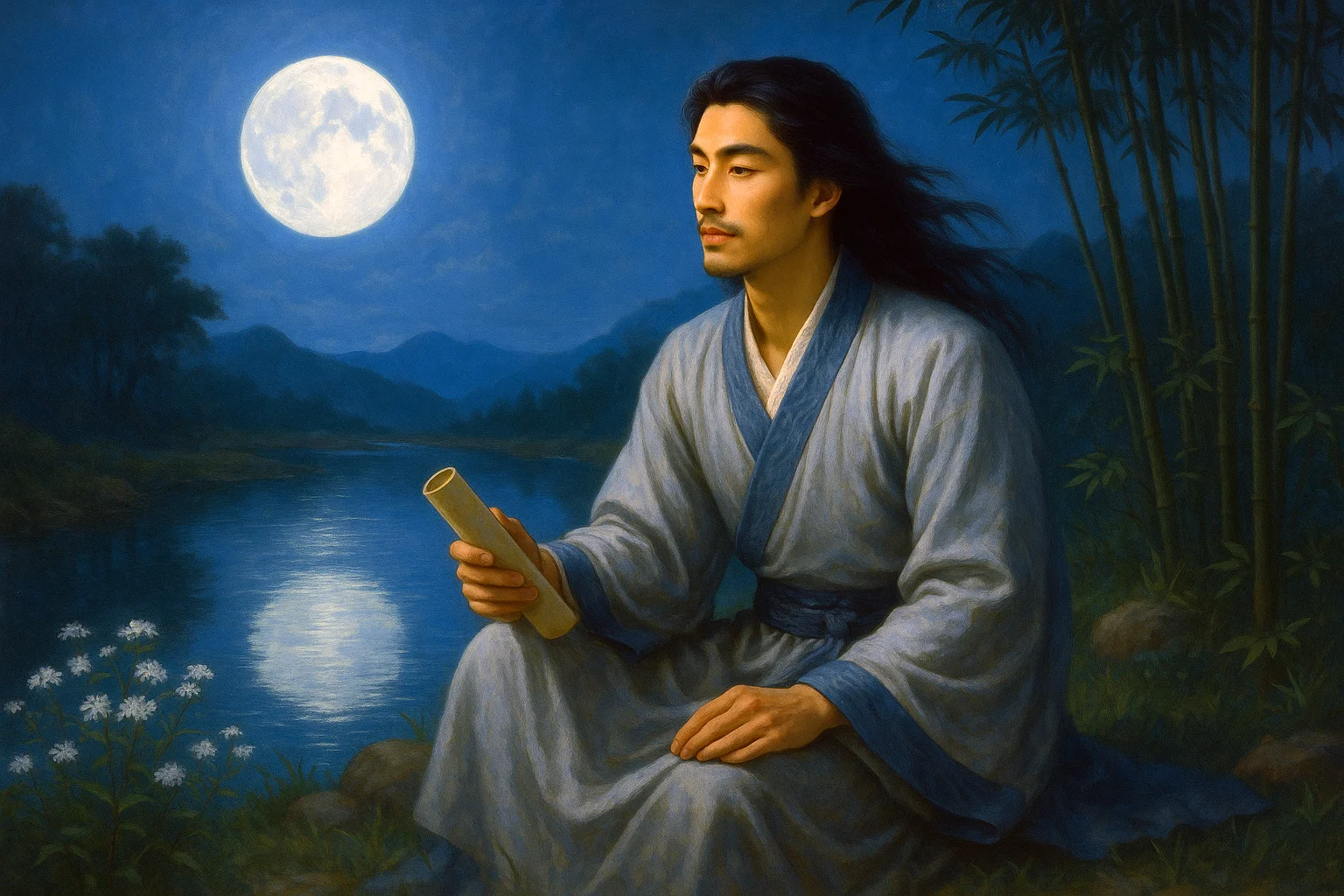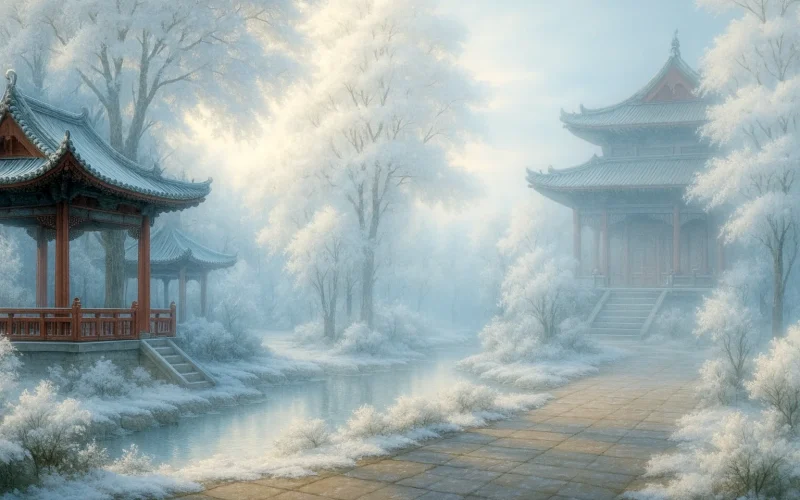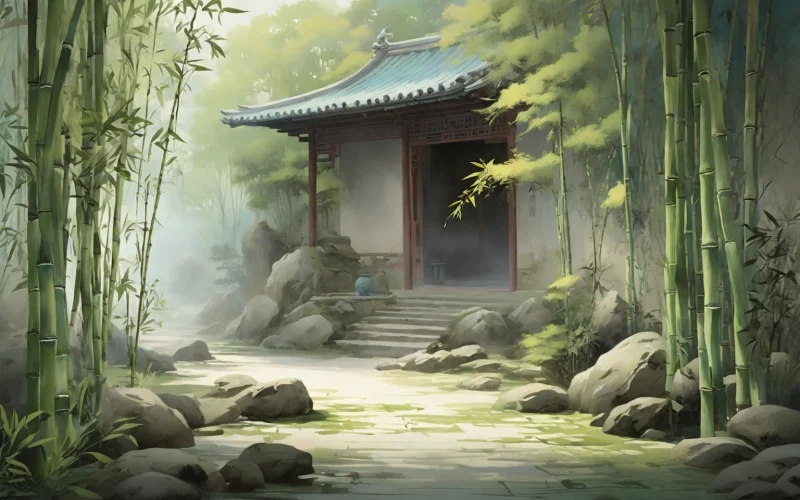No wind disturbs the garden's first light—
Frost-blooms crystallize in silent air.
I recall the Hall of Assembled Jade's depth-memory,
Where dancers' hairpins phase-shift into frost with symmetry.
Original Poem
「霿凇」
曾巩
园林初日静无风,霿凇花开处处同。
记得集英深殿里,舞人齐插玉笼㔶。
Interpretation
Composed during Zeng Gong's northern official service in winter, this poem captures the crystalline beauty of méngsōng (霿凇) - the rare frost flowers that form on trees during humid, freezing conditions. The Northern Song official, frequently stationed in cold regions, transforms this meteorological phenomenon into a meditation on nature's transient artistry and its evocative power to bridge present observation with courtly memories.
First Couplet: "园林初日静无风,霿凇花开处处同。"
Yuánlín chū rì jìng wú fēng, méngsōng huā kāi chù chù tóng.
Morning sun bathes the windless garden in hush; / Frost blossoms (méngsōng 霿凇) bloom uniformly on every bush.
The scene establishes perfect conditions for méngsōng formation: windless (静无风) and humid. "Uniform bloom" (处处同) emphasizes nature's democratic artistry, dressing all branches equally in icy florals.
Second Couplet: "记得集英深殿里,舞人齐插玉笼㔶。"
Jìde Jíyīng shēn diàn lǐ, wǔ rén qí chā yù lóng gǎn.
I recall deep in Jiying Palace's hall, / Dancers pinned jade hairpins (玉笼㔶), uniform and tall.
The memory of court dancers adorning "jade cage" hair ornaments (玉笼㔶) in unison creates a striking parallel - both frost flowers and hairpins represent ephemeral beauty meticulously arranged. The imperial Jiying Palace (集英殿), normally associated with state examinations, here becomes an unexpected stage for aesthetic recollection.
Holistic Appreciation
Though only four lines long, this poem unfolds with profound depth and exquisite craftsmanship. The first two lines paint a scene, while the latter two evoke memory—triggered by the present landscape. The poet employs "rime flowers" (霿凇), a natural marvel, likening ice-laden branches to the delicate ornaments of dancers. This not only captures nature’s beauty but also reveals a meditative nostalgia and the weight of lived experience.
Set against a cold, quiet backdrop, the poem avoids bleakness, instead radiating a serene joy and aesthetic sensitivity through crystalline clarity. Its language is spare yet vivid, its imagery layered, its emotion restrained—embodying Zeng Gong’s signature blend of "elegant simplicity" and "subtle ingenuity."
Artistic Merits
- Scene Guides Emotion, Fusion of Feeling and Form
The poet’s depiction of "first light in the garden" (园林初日) and "rime flowers blooming" (霿凇花开) draws forth memories of palace splendor, weaving emotion seamlessly into the landscape. This achieves a unity of scene and sentiment. - Clever Analogy, Novel Imagery
Comparing rime to "jade hairpins on dancers’ buns" (玉笼㔶) personifies nature’s artistry, lending the poem rich dimensionality and artistic tension. - Lucid Diction, Depth in Plainness
The language is unadorned yet potent, with each word carefully measured. Beneath its simplicity lies profound resonance—a hallmark of Zeng Gong’s "graceful ease."
Insights
This poem teaches us to embrace fleeting yet breathtaking beauty with a tranquil heart. Rime, born of harsh cold, transforms into a vision of icy purity—much like how adversity can coexist with aesthetic grace. Though surrounded by winter, the poet recalls the warmth of palace dancers, showcasing both sensitivity to beauty and the solace of memory. In today’s hurried world, these lines remind us to cherish nature’s details and the moments that once illuminated our lives.
About the Poet

Zeng Gong (曾巩, 1019 - 1083), a native of Nanfeng in Jiangxi province, stands among the illustrious "Eight Great Masters of Tang-Song Prose." His writings distinguished themselves through an elegant classical balance, celebrated for their rigorous argumentation and refined literary craftsmanship. While his poetry embraced an artless subtlety, his prose achieved what critics hailed as "the very essence of purity" - an achievement that, though perhaps less dazzling than his contemporaries like Su Shi or Wang Anshi, earned him posthumous reverence as the founding master of the "Nanfeng Literary School."












